Transactional Analysis - A Hands-On Theory
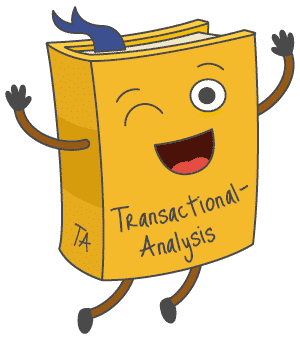
1. Definition Transactional Analysis
Eric Berne is the founder of Transactional Analysis. Here's one of his definitions of Transactional Analysis from his book: "What do you say after you say hello?" (1972):
“A system of psychotherapy based on the analysis of transactions and chains of transactions which occur during treatment sessions. A theory of personality based on the study of specific ego states. A theory of social action based on the rigorous analysis of transactions into an exhaustive and finite number of classes based on the specific ego states involved. The analysis of single transactions by means of transactional diagrams (this is Transactional Analysis proper).”

Here is another definition of Transactional Analysis according to Steffen Raebricht, founder of ta-course.com:
"Transactional Analysis (TA) is a theory, that can be easily taught and brought into practice. It makes individual mental processes and human interaction explicable, understandable and shapable. You will find out what happens:
- inside you,
- inside others
- and while communicating
And you will also see how you can develop each of these areas. TA gives you orientation with its clear purpose for human development (autonomy). Transactional Analysis can show you how you've already developed and areas in which you may have more potential. Through its positive image of the human being, it promotes true togetherness and relies on beneficial development.
That's why I see Transactional Analysis as a development accelerator."
2. Transactional Analysis Explained - Quick & Easy
When the word Transactional Analysis (TA) is used, many think of banking transactions first. In fact, it is a very concrete psychological system to better understand people and human relationships.
In contrast to the well-known transmitter-receiver model of communication theory, where communication units are spoken of, Transactional Analysis uses the term transactions. A transaction involves the exchange of information between two people's ego states.
These are the ego states:
Transactional Analysis assumes that people are in different states in different situations and contexts (professional / private).
It believes that this has implications for the possible interpretation of the information sent and received. In order to make the infinite number of possible states manageable, Transactional Analysis has simplified them and grouped them into six personality attitude / states. You can imagine them like an inner team. To further reduce complexity, these attitudes are assigned to three well-distinguishable ego states.
- A parent ego state (P) (judgements, conventions, certainties, attitudes)
- An adult ego state (A) (Information, factual reference, clarifications, objectivity)
- A child ego state (C) (reactions to alleged parental messages, expression of enthusiasm, pleasure and feelings such as anger, grief, fear and joy).

Every person has three ego states: parent, adult & child
In a nutshell: communication is the exchange of information between persons, a transaction is an exchange of information between ego states.
With the help of this sophisticated analysis tool, Transactional Analysis can make micro-units of communication observable and describable. It can thus explain effects in the communication process that other communication models cannot.
ENHANCE YOUR COMMUNICATION SKILLS
FREE Compact Course

- Communicate successfully in your professional life
- Enhance conflict management skills
- Understand others better
Learn Transactional Analysis with the Compact Course. Emails, Videos, PDF-Exercises.
No Spam. Unsubscribe at any time.
Example 1:
- Sent from adult ego state: "What time is it?"
- Receiving in adult ego state: "It is half past nine."
- Equals: The exchange of transactions between adult and adult ego state.
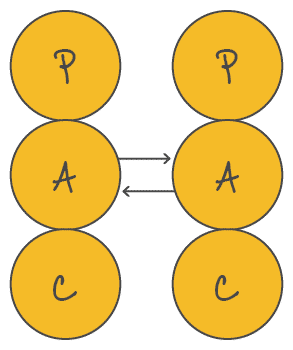
In Transactional Analysis parent, adult and child ego state are often abbreviated as shown above
Example 2:
- Sent from adult ego state: "When do you plan to have this finished?"
- Heard from the (rebellious) child ego state: "You'll see."
- Equals: The exchange of transactions between adult ego and (rebellious) child ego state.
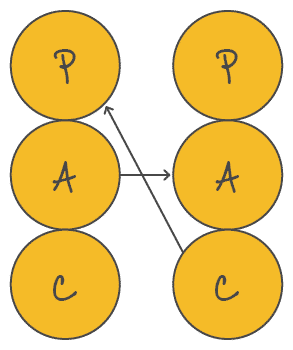
Transactional Analysis calles this a crossed transaction
Example 3:
- Sent from parent ego state: "I don't want this to happen again!"
- Heard from the (well-behaved) child ego state: "I will work harder from now on."
- Equals: The exchange of transactions between parent and child ego state.
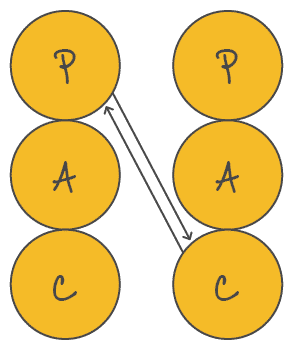
The process of a parent-child-transaction
With this method you can analyze every communication process according to the exchange of ego state to ego state. You analyze the transactions. As a result, the name Transactional Analysis has been derived for the entire system. In fact, the transactional analysis system contains many other insightful concepts.
You'd like to learn more about Transactional Analysis? Take a deep dive with the video course:

Through analysing the identifiable effects and the linguistic forms used, one can draw conclusions on the understanding:
- of oneself
- of others
- of the world in general and what attitude one has to it.
This concept alone already helps to understand relationships better and to create a more fulfilling togetherness.
3. Transactional Analysis Berne: History, Basic Beliefs
Eric Berne has founded TA Transactional Analysis. He was born in 1910 as Eric Lennard Bernstein in Canada. Later, he renamed himself Eric Berne, practiced psychiatry in the US and assumed US citizenship.

Eric Berne - Founder of Transactional Analysis
For many years Dr. Berne researched the phenomenon "intuition", sharpening his observations as to which forms of expression and observable clues triggered a certain intuition and brought it into a certain direction. He noticed that his clients showed themselves in perceptibly different states (ego states). Almost as if they were different people.
From these observations he formed the first concepts of a unique theory of intrapsychic dynamics and the dynamics of relationships between people. As a psychoanalytically trained physician, he practiced novel forms of therapy and moved away from his old teachings.
When in 1956 he made an application to join the psychoanalytic society, it was rejected. Spurred by this rejection, Berne developed more and more of his own concepts of psychotherapeutic work from which TA developed. In the 1960s, Dr. Berne and Transactional Analysis became popular by the publication his book "Games People Play" in the US (Published in 1964).
He had already gathered around him many interested psychologists and psychiatrists in the legendary "San Francisco Seminars". These in turn developed new and exciting concepts based on the theoretical framework of Berne. In 1964, the International Transactional Analysis Association (ITAA) was created in San Francisco.
It was an important topic for Eric Berne and his colleagues to work at eye level with their patients. They did not want to offer a "treatment" but use the personal resources and resources of the therapy group to pave the way for healing and personal development.
In this time of societal change, away from paralysis, racism and sexual liberation, the basic beliefs of Transactional Analysis emerged. Here is an overview:
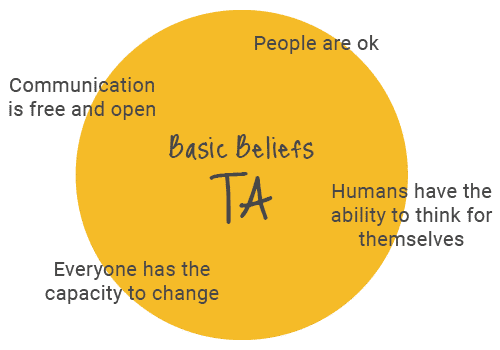
Download the image for your job and studies in high quality here:
More and more colleagues joined Eric Berne and developed their own models, which could be combined with his concepts. For example, Stephen Karpman developed the drama triangle, which combines perfectly with the ego states. You will get a first impression of the drama triangle in the examples at the end of this article. Here is a photo of Stephen Karpman with Steffen at the TA World Congress 2017 in Berlin.
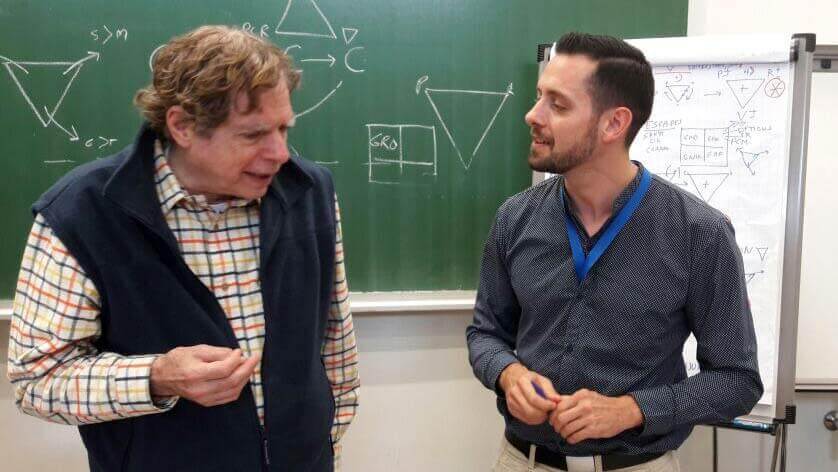
Stephen Karpman and me (Steffen) discussing about the Drama Triangle
Thus, gradually, a comprehensive theory and practice of a new psychological direction emerged, resting on a humanistic image of mankind.
If you want to become a Transactional Analyst, you have to get trained for it. You can find information about your first step with TA here.

Now you get an overview of how Transactional Analysts organize themselves.
4. TA Application Areas and Their Organisations
TA is taught in four main fields of application:
- Psychotherapy
- Consulting
- Education
- Organisation
However, the distinction is not always very clear. There are many Transactional Analysts working in different fields. Furthermore, there are occupations that cannot be uniquely assigned to any of these four fields.
Across the world, people who work or are interested in Transactional Analysis have joined forces in associations known as TA societies. A goal of these societies is the promotion and spreading of TA:
- International Transactional Analysis Association (ITAA) http://itaaworld.org
- European Association for Transactional Analysis (EATA)http://www.eatanews.org
- United States of America Transactional Analysis Association (USATAA) https://www.usataa.org/
- UK Association for Transactional Analysis (UKATA) http://www.uktransactionalanalysis.co.uk/
The TA associations set training standards. Like this, the TA-certified training is recognized worldwide.
You can even take a certified training online. If you are interested, you can look here.
5. Transactional Analysis Examples
Now on to some examples of how you can successfully apply Transactional Analysis in your daily life:
a) Transactional Analysis Examples: Asking for help with Changing Ego-States
Mareike goes on a jungle tour with her husband. They wade through several rivers. Secretly, Mareike occasionally wishes her husband to support her by, for example, offering her a helping hand.
- She is in a childlike state (child ego state) in which she feels helpless.
- At first she interprets his behavior (he does not help her) as "inconsiderate" and starts to get angry (change to the judgmental parent ego state).
- Then she realizes that she has the opportunity to ask for help - and does so. Her husband then supports her as she has wished. By becoming aware of her childlike feelings and the (adult) possibility of asking for help, she has changed her ego state again and occupied the adult ego.
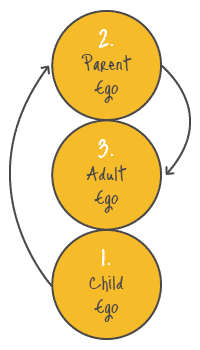
Change from child to parent and finally to adult ego state.
By making a new decision, Mareike stepped out of her old non-purposeful pattern of behavior and replaced it with an actively targeted one. She no longer waited mute or miserable for someone to help her, but actively made sure she got what she needed. She was proud of herself and mentally patted her shoulder.
b) Transactional Analysis Examples: Don't Get Hurt Anymore through Concious Feelings
I (Steffen) took the train at the beginning of a big travel. Two friends said goodbye. Suddenly a man smelling strongly of alcohol came to our round and began to dominate the conversation. Suddenly, one of my friends said to him, "Look, we'd like to say goodbye, would it be okay for you if we could just be with each other for a little while?" The man apologized and left. My friend said to us, "I would not have said anything in the past and instead would have collected an annoyance discount stamp. Today not any longer." We laughed.
The concept of the trading stamps belongs to the topic of feelings. Collecting discount/trading stamps means that you can pile up your anger feelings and pick them up for a later redemption. At some point, there will be the straw to break the camel's back and one releases all their accumulated anger. Had my friend withheld his anger, it might have happened that he had later talked roughly with his little daughter.
c) Examples Transactional Analysis: Prevent Disputes with the Drama Triangle
The drama triangle is a popular concept of Transactional Analysis. It includes:
- Rescuer - Position
- Persecutor - Position
- Victim - Position
For couples, there is sometimes a well-established imbalance between seemingly strong positions (at the top of the drama triangle) and a seemingly weak position (at the bottom of the drama triangle). It is the question of who wears the trousers. The strong part then often takes on too much responsibility or knows better, while the weak one does not recognize their opportunities and responsibilities.
Such a dynamic can end uplike this, for example:
- The person taking the victim role changes to the persecutor and accuses the other one: “We always have to do it your way!”
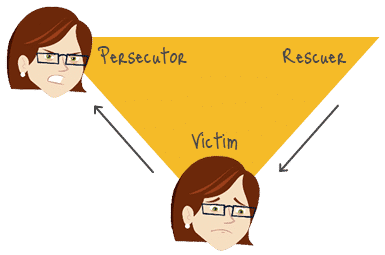
The two players change roles. While she moves from the victim to the persecutor role, he is invited to the victim position.
- Or the rescuer is annoyed by the lack of independence of the partner and changes into the persecutor: "Don't you see that? Do something about it yourself! "
At the end of the dynamic in the drama triangle, the participants always experience at least bad feelings. If not worse.
These were Transactional Analysis examples. With its clear and easy-to-understand concepts you can analyze very complex situations. The article was written by Bernd Taglieber and Steffen Raebricht. If you have questions or comments, just use the comment function. We answer personally!

